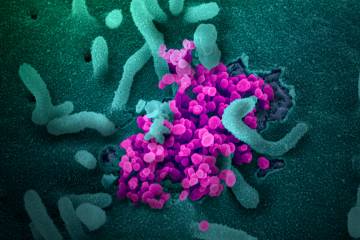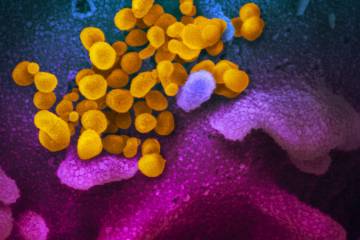Last week, with the spring term set to begin at the Johns Hopkins Bloomberg School of Public Health, everyone's mind was fixed on the pandemic barreling around the planet.
At the time, the Bloomberg School didn't plan to offer any specific course on COVID-19, in spite of the virus's growing impact on public health. Within a matter of days, however, a team of faculty members developed a new class, ushered it through approvals, and made it available to students in time for the add/drop period earlier this week.
"We saw the enrollment immediately rising—20, 80, 100," says Meghan McGinty, an associate faculty member at the Bloomberg School who helped lead the effort. Now, more than 380 Johns Hopkins students are enrolled in the new class, Current Issues in Public Health: COVID-19 Pandemic Response.
"This is the greatest public health challenge our world has faced this century, and it's happening in real time," McGinty says. "Our students were clamoring for an in-depth look at it."
With lectures from various Johns Hopkins experts, students will study the global pandemic from a mix of scientific, social, and policy perspectives. Topics include vaccine development, coronavirus epidemiology, health care ethics, and mental health consequences.
McGinty leads the class along with Bloomberg faculty members Caitlin Kennedy, Jessica Atwell, Alain Labrique, and TA Anastasia Lambrou. The first session—a colossal Zoom conference—took place Tuesday.
"You could scroll through pages and pages of people's faces on the screen," Kennedy says.
The class also involves a massive effort in data collection, with students tracking the interventions that different countries are trying to combat the pandemic—measures like closing schools and enforcing social distancing.
"We're asking students to identify public health policy and program interventions that are being used in every country in the world, and comparing those with the pandemic trends," says David Peters, chair of the Bloomberg School's Department of International Health who developed the project with Hopkins infectious disease expert Andrew Azman.
Johns Hopkins is teaming with software company TimeGraphics to visually represent those trends on a timeline. The data, Peters says, will provide critical evidence on how effective these interventions prove to be.
"This will be the first known attempt to systematically document public health efforts around the world to respond to a pandemic," he says.
Peters says the new COVID-19 course came together "with lightning speed" with support from all departments at the Bloomberg School as well as from Dean Ellen MacKenzie.
Open to all students at JHU, the class has drawn undergraduates, graduate students, and distance learners from locations around the world.
Christopher Carita, a police detective in Fort Lauderdale, Florida, who is also a Bloomberg American Health Fellow at Hopkins, says he enrolled to keep pace with COVID-19 as his own city responds to it.
"I'm seeing our city having to process information from many sources to make decisions," he says. "It's the first time we as a police department have had to shift focus to support a public health effort. I thought it was important as an officer and for the sake of my department to educate myself."
The first class session featured Eric Toner, a senior scientist with the Johns Hopkins Center for Health Security. During its eight-week run, the class will bring in a variety of other Hopkins experts, including Jennifer Nuzzo, Alexander McCourt, Andy Pekosz, and David Bishai
"Every crisis presents an opportunity to learn. If anything, this pandemic shows us exactly why public health is so important," Peters says. "[At Hopkins,] we've got phenomenal experts all in one place who can share their knowledge."
Posted in Health
Tagged school of public health, coronavirus












